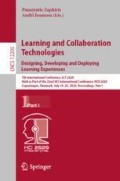Abstract
E-learning, which can be used anywhere and at any time, is very convenient and has been introduced to improve learning efficiency. However, securing a completion rate has been a major problem. Recently, the learning forms of e-learning require learners to be introspective, deliberate, and logical and have proven to be incompatible with many learners of low completion rates. In this paper, we propose an e-learning system that allows learners to deepen their understanding by creating a concept-map while watching a video. This system supports the presentation of candidate components such as concept-labels and related words from lecture speech texts when creating a concept map, which is difficult to create from scratch within a short time the learner is playing a video. Then, by interactively creating the proper concept-map of learning content aids the learner to learn the learning content in reflective and active thinking ways. Further, we conducted an experiment to compare a simple concept-map creation interface and a non-concept-map interface to confirm the effectiveness of our proposed system.
Access this chapter
Tax calculation will be finalised at checkout
Purchases are for personal use only
References
Alraimi, K.M., Zo, H., Ciganek, A.P.: Understanding the MOOCs continuance: the role of openness and reputation. Comput. Educ. 80, 28–38 (2015)
Combs, L.: The design, assessment, and implementation of a web-based course. Assoc. Adv. Comput. Educ. 12(1), 27–37 (2004)
Dalmolin, A.C., Mackeivicz, G.A.O., Pochapski, M.T., Pilatti, G.L., Santos, F.A.: Learning styles preferences and e-learning experience of undergraduate dental students. Revista de Odontologia da UNESP 47(3), 175–182 (2018)
DeLeeuw, K., Mayer, R.E.: A comparison of these measures of cognitive load: evidence for separable measures of intrinsic, extraneous, and germane load. J. Educ. Psychol. 100, 223–234 (2008)
Grau, J., Minguillon, J.: When procrastination leads to dropping out: analysing students at risk. eLC Res. Paper Ser. 6, 63–74 (2013)
Guo, P.J., Kim, J., Rubin, R.: How video production affects student engagement: an empirical study of MOOC videos. In: Proceedings of the first ACM Learning@ Scale Conference, pp. 41–50 (2014)
Huang, E., Lin, S., Huang, T.: What type of learning style leads to online participation in the mixed mode e-learning environment? A study of software usage instruction. Comput. Educ. 58(1), 338–349 (2012)
Khalil, H., Ebner, M.: MOOCs completion rates and possible methods to improve retention - a literature review. In: 2014 Proceedings of World Conference on Educational Multimedia, Hypermedia and Telecommunications, pp. 1236–1244 (2014)
Kizilcec, R.F., Papadopulolos, K., Sritanyaratana, L.: Showing face in video instruction: effects on information retention, visual attention, and affect. In: Proceedings of the Annual SIGCHI Conference on Human Factors in Computing Systems, pp. 2095–2102 (2014)
Liu, C., Kim, J., Wang, H.: ConceptScape: collaborative concept mapping for video learning. In: Proceedings of the 2018 CHI Conference on Human Factors in Computing Systems. Paper no. 387, pp. 1–12 (2018)
Mayer, R.: Learning environments: the case for evidence-based practice and issue-driven research. Educ. Psychol. Rev. 15, 359–373 (2003)
Mayer, R.E.: Principles of multimedia learning based on social cues: personalization, voice, and image principles. In: Mayer, R.E. (ed.) The Cambridge Handbook of Multimedia Learning, pp. 201–212. Cambridge University Press (2005)
Meng, X., Zhao, S., Edge, D., HyNote: integrated concept mapping and notetaking. In: Proceedings of the International Working Conference on Advanced Visual Interfaces, pp. 236–239 (2016)
Morita, Y., Koen, B., Ma, G., Wu, Z., Johendran, A.: Pilot study of the relationships between learning progress and learning style in a web-based PSI course. Proc. E-Learn 2005, 2243–2248 (2005)
Mduma, N., Kalegele, K., Machuve, D.: A survey of machine learning approaches and techniques for student dropout prediction. Data Sci. J. 8(14), 1–10 (2019)
Novak, J.D.: Concept mapping: a useful tool for science education. J. Res. Sci. Teach. 27(10), 937–949 (1990)
Novak, J.D., Canas, A.J.: The theory underlying concept maps and how to construct and use them. Technical Report IHMC CmapTools, Florida Institute for Human and Machine Cognition (2008)
Simpson, O.: 22% - can we do better? CWP Retention Liter. Rev. 47 (2010)
Simpson, O.: Student retention in distance education: are we failing our students. Open Learn.: J. Open Distance e-Learn. 28(2), 105–119 (2013)
Tominaga, A., Kogo, C.: Developments and issues in practical studies of e-learning. Annu. Rep. Educ. Psychol. Jpn. 53, 156–165 (2014). (in Japanese)
Villalon. J., Calvo. R.A., Montenegro. R.: Analysis of a gold standard for concept map mining? How humans summarize text using concept maps. In: Proceedings of the 4th International Conference on Concept Mapping, pp. 14–22 (2010)
Acknowledgement
This work was supported by JSPS KAKENHI Grant Number 19K12264.
Author information
Authors and Affiliations
Corresponding author
Editor information
Editors and Affiliations
Rights and permissions
Copyright information
© 2020 Springer Nature Switzerland AG
About this paper
Cite this paper
Hayama, T., Sato, S. (2020). Supporting Online Video e-Learning with Semi-automatic Concept-Map Generation. In: Zaphiris, P., Ioannou, A. (eds) Learning and Collaboration Technologies. Designing, Developing and Deploying Learning Experiences. HCII 2020. Lecture Notes in Computer Science(), vol 12205. Springer, Cham. https://doi.org/10.1007/978-3-030-50513-4_5
Download citation
DOI: https://doi.org/10.1007/978-3-030-50513-4_5
Published:
Publisher Name: Springer, Cham
Print ISBN: 978-3-030-50512-7
Online ISBN: 978-3-030-50513-4
eBook Packages: Computer ScienceComputer Science (R0)

